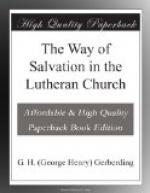“Dr. Robert Crook took the ground that special evangelistic agencies are not necessary, and that the work is more permanent and successful when performed through the regular church channels. Rev. J. Selleck, of Lexington avenue church, had sent about sixty of his members as singers and ushers, and had not only received not a single convert from that place into his church, but had been unable to gather in the members he gave them, who were still running here and there after sensations! Rev. J.F. Richmond had received a number of cards, and could report two or three converts who would unite with his church, but in connection with Hope Chapel he had not much success. He had gone to five places indicated on the cards as residences of converts, but could find none of them. This was his experience also with many others whom he had sought out. Rev. John Jones had received many cards, and had found out some direct frauds, and many others nearly so. He did discover eight persons converted at Mr. Moody’s meetings, six of whom would unite with his church. Rev. C.G. Goss did not think any one effort or kind of effort was going to convert the world. We could not measure religious efforts by financial or numerical measurements. As to the general question, he had the history of ten city churches always known as revival churches. In 1869 they had reported one hundred probationers each. In 1870 they reported a net loss of five hundred, making, with the probationers reported, a loss of fifteen hundred in one year, in ten churches.
“Bedford street church was an example of a revival church: St. Paul’s the opposite. The former reported, in twenty years, twenty-five hundred probationers. But the increase of her membership for that period was only one hundred and twenty-eight. He could not account for this. On the other hand, St. Paul’s reported four hundred and forty-eight probationers, for twenty-five years, and her increase in membership has been two hundred and eighty-six. This was to him an argument in favor of regular church work.”
CHAPTER XXVII.
TRUE REVIVALS.
In the preceding pages we have seen that the Church ought constantly to aim at keeping up such a state of spiritual life as to render revivals unnecessary.
We have also admitted that, owing to human infirmity, carelessness, and neglect of a proper and prayerful use of the means of Grace, the spiritual life will ofttimes languish in individuals, in families, in congregations and communities; and that, at such times, a spiritual awakening or refreshing is necessary.
We have further shown, that the modern revival system is unscriptural and positively injurious in its consequences, and therefore cannot be regarded or adopted as a part of God’s Way of Salvation. What then is to be done? A revival is really needed. What sort of a revival shall be longed for, prayed for, and labored for?




